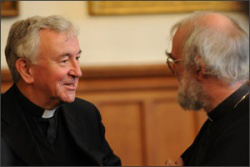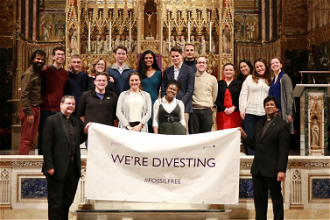Pope Benedict establishes structure to enable Anglicans to enter Roman Catholic Church

Archbishop Vincent Nichols, Archbishop of Canterbury Dr Rowan Williams at today's conference
At joint press conferences held in Rome and London this morning, a canonical structure was announced that will provide for the establishment of Personal Ordinariates around the world, to allow former Anglicans to enter into full communion with the Catholic Church while preserving elements of Anglican liturgy.
At the press conference in Westminster, held by the Archbishop of Canterbury, Dr Rowan Williams, Archbishop Vincent Nichols, Archbishop Kevin McDonald of Southwark and Bishop Christopher Hill of Guildford the following joint statement was issued by the Catholic and Anglican church leaders:
Joint Statement from the Archbishop of Westminster and the Archbishop of Canterbury:
Today’s announcement of the Apostolic Constitution is a response by Pope Benedict XVI to a number of requests over the past few years to the Holy See from groups of Anglicans who wish to enter into full visible communion with the Roman Catholic Church, and are willing to declare that they share a common Catholic faith and accept the Petrine ministry as willed by Christ for his Church.
Pope Benedict XVI has approved, within the Apostolic Constitution, a canonical structure that provides for Personal Ordinariates, which will allow former Anglicans to enter full communion with the Catholic Church while preserving elements of distinctive Anglican spiritual patrimony.
The announcement of this Apostolic Constitution brings to an end a period of uncertainty for such groups who have nurtured hopes of new ways of embracing unity with the Catholic Church. It will now be up to those who have made requests to the Holy See to respond to the Apostolic Constitution.
The Apostolic Constitution is further recognition of the substantial overlap in faith, doctrine and spirituality between the Catholic Church and the Anglican tradition. Without the dialogues of the past forty years, this recognition would not have been possible, nor would hopes for full visible unity have been nurtured. In this sense, this Apostolic Constitution is one consequence of ecumenical dialogue between the Catholic Church and the Anglican Communion.
The on-going official dialogue between the Catholic Church and the Anglican Communion provides the basis for our continuing cooperation. The Anglican Roman Catholic International Commission (ARCIC) and International Anglican Roman Catholic Commission for Unity and Mission (IARCCUM) agreements make clear the path we will follow together.
With God’s grace and prayer we are determined that our on-going mutual commitment and consultation on these and other matters should continue to be strengthened. Locally, in the spirit of IARCCUM, we look forward to building on the pattern of shared meetings between the Catholic Bishops Conference of England and Wales and the Church of England’s House of Bishops with a focus on our common mission. Joint days of reflection and prayer were begun in Leeds in 2006 and continued in Lambeth in 2008, and further meetings are in preparation. This close cooperation will continue as we grow together in unity and mission, in witness to the Gospel in our country, and in the Church at large.
+ Rowan Williams
Archbishop of Canterbury
+ Vincent Nichols
Archbishop of Westminster
The Congregation for the Doctrine of the Faith in Rome issued the following statement:
1. With the preparation of an Apostolic Constitution., the Catholic Church is responding to the many requests that have been submitted to the Holy See from groups of Anglican clergy and faithful in different parts of the world who wish to enter into full visible communion.
In this Apostolic Constitution the Holy Father has introduced a canonical structure that provides for such corporate reunion by establishing Personal Ordinariates, which will allow former Anglicans to enter full communion with the Catholic Church while preserving elements of the distinctive Anglican spiritual and liturgical patrimony. Under the terms of the Apostolic Constitution, pastoral oversight and guidance will be provided for groups of former Anglicans through a Personal Ordinariate, whose Ordinary will usually be appointed from among former Anglican clergy.
The forthcoming Apostolic Constitution provides a reasonable and even necessary response to a world-wide phenomenon, by offering a single canonical model for the universal Church which is adaptable to various local situations and equitable to former
Anglicans in its universal application. It provides for the ordination as Catholic priests of married former Anglican clergy.
Historical and ecumenical reasons preclude the ordination of married men as bishops in both the Catholic and Orthodox Churches. The Constitution therefore stipulates that the Ordinary can be either a priest or an unmarried bishop. The seminarians in the Ordinariate are to be prepared alongside other Catholic seminarians, though the Ordinariate may establish a house of formation to address the particular needs of formation in the Anglican patrimony. In this way, the Apostolic Constitution seeks to balance on the one hand the concern to preserve the worthy Anglican liturgical and spiritual patrimony and, on the other hand, the concern that these groups and their clergy will be integrated into the Catholic Church.
Cardinal William Levada, Prefect of the Congregation for the Doctrine of the Faith which has prepared this provision, said: “We have been trying to meet the requests for full communion that have come to us from Anglicans in different parts of the world in recent years in a uniform and equitable way. With this proposal the Church wants to respond to the legitimate aspirations of these Anglican groups for full and visible unity with the Bishop of Rome, successor of St Peter.”
These Personal Ordinariates will be formed, as needed, in consultation with local Conferences of Bishops, and their structure will be similar in some ways to that of the Military Ordinariates which have been established in most countries to provide pastoral
care for the members of the armed forces and their dependents throughout the world. “Those Anglicans who have approached the Holy See have made clear their desire for full, visible unity in the one, holy, catholic and apostolic Church. At the same time, they have told us of the importance of their Anglican traditions of spirituality and worship for their faith journey,” Cardinal Levada said.
2. The provision of this new structure is consistent with the commitment to ecumenical dialogue, which continues to be a priority for the Catholic Church, particularly through the efforts of the Pontifical Council for the Promotion of Christian Unity. “The initiative has come from a number of different groups of Anglicans,” Cardinal Levada went on to say: “They have declared that they share the common Catholic faith as it is expressed in the Catechism of the Catholic Church and accept the Petrine ministry as something Christ willed for the Church. For them, the time has come to express this implicit unity in the visible form of full communion.”
According to Levada: “It is the hope of the Holy Father, Pope Benedict XVI, that the Anglican clergy and faithful who desire union with the Catholic Church will find in this canonical structure the opportunity to preserve those Anglican traditions precious to them
and consistent with the Catholic faith. Insofar as these traditions express in a distinctive way the faith that is held in common, they are a gift to be shared in the wider Church. The unity of the Church does not require a uniformity that ignores cultural diversity, as the history of Christianity shows. Moreover, the many diverse traditions present in the Catholic Church today are all rooted in the principle articulated by St Paul in his letter to the Ephesians: ‘There is one Lord, one faith, one baptism’ (4:5). Our communion is therefore strengthened by such legitimate diversity, and so we are happy that these men and women bring with them their particular contributions to our common life of faith.”
At this morning's press conference both Archbishop Vincent Nichols and Dr Rowan Williams emphasised that the new arrangement would not damage relations between the two churches. "The symbolism of our presence together here today should not be lost" Archbishop Nichols said.
Dr Williams opened his comments saying: "The fact that we are able to do this together tells a story." He said: "I do not think this constitution will be seen as in any sense a commentary on Anglican problems offered by the Vatican. It is a response to this range of requests and inquiries from a very broad variety of people, either Anglican or of Anglican heritage. In that sense it has no negative impact on the relations of the communion as a whole to the Roman Catholic church as a whole. It is not an act of aggression, it is not a statement of no confidence. It is business as usual." A new round of meetings with ARCIC is due to begin soon, he said.
None of the clergy said they had idea how many people would be likely to seek admission to the Catholic Church under the new arrangements. Bishop Hill said he suspected there would be more clergy rather than laity. "I don't expect vast numbers" he said, "but that's not to say we don't have strong ecumenical relations in the diocese."





















